Podcast
Questions and Answers
What role did General Thomas Gage play at the beginning of the American Revolution?
What role did General Thomas Gage play at the beginning of the American Revolution?
- He was the commander of the Continental Army.
- He was a British soldier at Lexington and Concord.
- He was named governor of Massachusetts. (correct)
- He led the Provincial Congress.
Why did Loyalists oppose the Patriots during the American Revolution?
Why did Loyalists oppose the Patriots during the American Revolution?
- They were largely indifferent to political affairs.
- They feared social disorder and chaos. (correct)
- They believed in a strong military presence.
- They sought independence for the colonies.
What was the impact of Thomas Paine's 'Common Sense' on colonial opinion?
What was the impact of Thomas Paine's 'Common Sense' on colonial opinion?
- It decreased support for the British government.
- It caused more divisions among colonial leaders.
- It encouraged loyalty to the British crown.
- It swung public opinion in favor of independence. (correct)
What actions caused Loyalists to view some Patriot activities as illegal?
What actions caused Loyalists to view some Patriot activities as illegal?
What decision did the Second Continental Congress respond to regarding independence?
What decision did the Second Continental Congress respond to regarding independence?
Flashcards
American Revolution's start
American Revolution's start
The American Revolution began in 1775 after the Coercive Acts (Intolerable Acts) led to the clash at Lexington and Concord caused by conflict about taxes, oaths, militias, and shutting down Loyalist newspapers.
Loyalist vs. Patriot
Loyalist vs. Patriot
Patriots supported independence from Britain, while Loyalists wanted to remain loyal to the British Crown.
Continental Army
Continental Army
The Continental Army comprised colonial troops under the leadership of George Washington, formed to fight against the British.
Common Sense's impact
Common Sense's impact
Signup and view all the flashcards
Declaration of Independence's ideas
Declaration of Independence's ideas
Signup and view all the flashcards
Study Notes
The Declaration of Independence
- The Declaration of Independence was a formal announcement, signifying the colonies' separation from Great Britain.
- The document was officially adopted on July 4, 1776.
- The declaration stressed self-reliance and freedom from external control.
Learning Objectives
- Understanding the causes of the American Revolution, the response of the Second Continental Congress, and the perspectives of Loyalists and Patriots, are key objectives.
- Evaluating the impact of Thomas Paine's Common Sense and the reasoning behind Congress' declaration of independence are also essential learning objectives.
War Begins
- The Intolerable Acts of 1774 led to the appointment of General Thomas Gage as governor of Massachusetts.
- Colonial leaders, including John Hancock and Samuel Adams, convened a Provincial Congress.
- The Battles of Lexington and Concord marked the start of the American Revolution in 1775.
- British soldiers (Redcoats) clashed with colonial militias.
- George Washington, a veteran of the French and Indian War, was appointed commander of the Continental Army.
Patriots and Loyalists Disagreed
- Loyalists opposed the Patriots' demands due to concerns about disorder and feared the consequences of rebellion.
- Some Loyalists profited from the British government, which influenced their views.
- Loyalists viewed some Patriots' actions as unlawful and excessively aggressive.
- Loyalists disliked taxes, oaths, militia drafts, and the suppression of Loyalist newspapers imposed by the Patriots.
- Thomas Paine's Common Sense (1776) swayed public opinion toward independence in the colonies.
2nd Continental Congress
- Representatives from the colonies convened at the Second Continental Congress to formally declare their intention to go to war.
- A committee was elected to draft a document to present to the King, which later became known as the Declaration of Independence.
Declaration of Independence
- Thomas Jefferson crafted the detailed justifications for the colonies' separation from Great Britain.
- Jefferson argued that the British King failed to protect the colonists' interests, necessitating the establishment of a new nation.
- Jefferson's ideas were influenced by John Locke's philosophies, particularly the concepts of natural law and natural rights.
- Locke believed in the existence of natural laws by which individuals were expected to govern themselves, because of their human nature.
- Locke proposed that every human was entitled to certain natural rights, such as life, liberty, and property, granted by the Creator.
- Jefferson's Declaration articulated the colonies' unalienable rights, stressing that these rights couldn't be revoked.
- The document asserted that governments derive their power from the consent of the governed.
- Citizens have the right to overthrow governments that violate their rights.
- The declaration also addressed the rationale and justification for the colonies' separation.
Common Sense
- In his pamphlet, Common Sense, Thomas Paine argued that the King was controlling the colonies' political rights and power.
- Paine urged the colonies to declare independence, highlighting the importance of self-government.
- Paine's pamphlet fueled support for independence in the colonies.
Uncertain Future
- Benjamin Franklin, in drawings from the 1750s, stressed the necessity for colonial unity to successfully oppose Great Britain.
- Joining the Patriot cause came with significant risks, putting everything on the line.
Studying That Suits You
Use AI to generate personalized quizzes and flashcards to suit your learning preferences.




